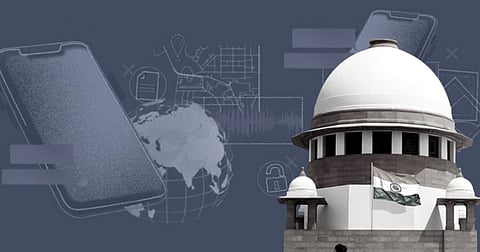

Of the 29 phones examined by the Technical Committee, only five had malware, and even this could not be said to be that of Pegasus, according to the Justice R.V. Raveendran committee's three-part report submitted to the Court today.
—
THE Supreme Court on August 24 opened the sealed cover containing the reports of the Technical Committee, as well as its supervising former judge, which was formed by it in October last year to probe the veracity of the allegations against the Union Government for its use of the Israeli spyware Pegasus to target activists, journalists, politicians, judges and government officials.
The bench, comprising the Chief Justice of India ('CJI') N.V. Ramana, and Justices Surya Kant and Hima Kohli, went through the report in open court. CJI Ramana informed the court that the reports run into three parts. He also informed the advocates appearing in the matter that the technical committee examined 29 phones. Of them, five phones had some malware but the technical committee says it could not be said to be Pegasus.
The CJI also added that former Supreme Court judge R.V. Raveendran, who oversaw the Pegasus committee, recommended changes in the existing law governing surveillance in the country. Besides, Justice Raveendran recommended that privacy protections must be enhanced along with the cyber security of the nation.
CJI Ramana said that Justice Raveendran's report would be uploaded on the court's website, but the technical committee report would be uploaded in redacted form as the committee members have requested for non-disclosure of some personal data.
On October 27, 2021, the Supreme Court has formed a Committee supervised by Justice Raveendran, assisted by former Indian Police Service (1976 batch) officer Alok Joshi, and Dr. Sundeep Oberoi, Chairman, Sub Committee in (International Organisation of Standardisation/ International Electro-Technical Commission/Joint Technical Committee).
Besides, it had three technical members:
The court had said that it was compelled to form the independent committee because:
The Committee was to enquire, investigate and determine:
"The State cannot get a free pass every time by raising national security concerns. No omnibus prohibition can be called against judicial review", the Supreme Court had said.
The Union Government had informed the court that it did not want to file a detailed affidavit in the matter. Whether the government used a particular software for authorized interception could not be the subject matter of a court debate, Solicitor General of India Tushar Mehta had said, reiterating that the government was willing to constitute a committee of domain experts which could go into the issue.